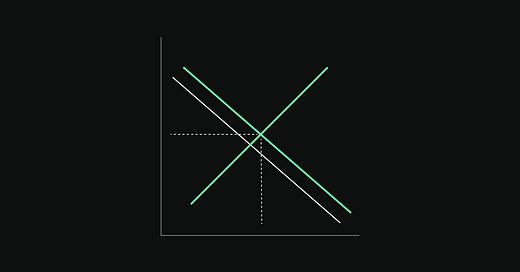TL;DR
Prices of most goods and services are determined by mass behavior and the interplay of who wants something and who has it.
While our intuition about what a physical good like a phone, house or sandwich should cost is tied to what we believe is a fair price given our personal preferences, in reality, prices are determined by the masses and their behavior.
Generally, the more demand there is for something, the more expensive that thing becomes. This effect is particularly strong if the supply of that thing is limited.
The more people want to buy property in the inner city or at the beach, the more prices will go up — especially because the amount of such property available is limited.
→ The demand for beachfront houses meets limited beachfront space and supply of these houses.
The more people want to eat at the airport, the more expensive airport food will get — especially because there is a very limited number of food stalls at each terminal.
→ The demand for food at the airport meets limited mobility (closed terminals) and a restricted supply of restaurants on small space.
The more people want to see entertaining football matches, the more expensive it will become to sign and pay for superstar players — especially since there are only very few people who can play football at the elite level.
→ The demand for professional football meets a limited number of players with adequate skills.
The more companies need tech-savvy engineers, the more salaries for programmers will go up — especially because there are only so many people who can work with computer code well enough.
→ The demand for highly skilled workers meets a limited supply of well enough educated individuals.
The main mechanic behind prices adjusting to the interplay of supply and demand is that the higher prices become, the less people (or companies) are willing to pay for something (a house, food at the airport, salaries of football players and engineers, etc.).
Prices tend to raise to the point where all that's available will be sold even if this means that many others couldn't or didn't want to buy at that price.
To Remember
“The price of ability does not depend on merit but on supply and demand.”
— George Bernard Shaw
Explore
➞ For an extremely insightful 12 min. explanation of how prices emerge from the interaction between buyers and sellers, watch this Primer animated video on YouTube.
➞ This CrashCourse video gives a great introduction to the basics of supply, demand and price development.
➞ For the basics of supply and demand and how they influence markets, read this Wikipedia article.
➞ Check out this blog post for a few illuminating real life examples of supply and demand at play.
Resources
For a structured list of fascinating books, blogs, podcasts, and Youtube channels related to systems, structures and principles of science, visit mindvault.co/vault/supplydemand.




